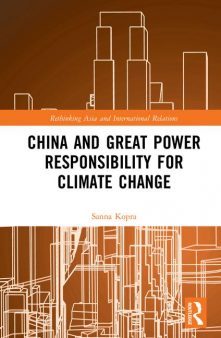China’s great power climate responsibility and the Arctic
20 February 2019
By Sanna Kopra.
Despite scientific consensus on the multiple adverse effects of climate change, international negotiations on climate change have been slow and troublesome. In my previous study, I suggested that one reason for this has been the lack of great power leadership in international climate politics: Great powers have failed to acknowledge that with great power comes great climate responsibility.
Between the 1960s and the early 1990s, when the United States (US) played a leadership role, important steps were taken in regard to international environmental politics. After the US abandoned the Kyoto Protocol in the late ’90s, international climate negotiations remained in gridlock for a decade, and no significant progress was made until President Barack Obama acknowledged the US’s great power responsibility for climate change. In addition to China’s domestic developments, such as public health problems caused by air pollution and the necessity to undertake structural reforms, Obama’s diplomatic efforts convinced China to take a more constructive role in international climate negotiations. Thus, Sino-American cooperation on climate change made possible the establishment of the Paris Agreement.
Only a few days after the Paris Agreement went into effect, Donald J. Trump, a self-announced climate sceptic, was elected president of the US. This – and especially Trump’s announcement to withdraw the US from the Paris Agreement – ended that nation’s leadership role in international climate politics. Consequently, the international community began to hope that China would step up and fulfil the leadership vacuum in international climate negotiations, and to some extent, China seemed to respond positively.
In particular, in his speech to the 19th Chinese Communist Party Congress in October 2017, China’s President Xi Jinping declared: “Taking a driving seat in international cooperation to respond to climate change, China has become an important participant, contributor, and torchbearer in the global endeavor for ecological civilization.” For China, the norm of climate responsibility indeed seems to be an appealing way of defining its responsibility as a great power. In practice, however, it remains unclear whether China is really willing and able to play a leadership role in international climate negotiations.
Since climate change has been shown to be progressing more than twice as fast in the Arctic region as in the rest of the world, the future of the Arctic is highly dependent on the ambition of international efforts to tackle climate change. In my ongoing project, I study how notions of great power (climate) responsibility direct China’s policies and practices in the Arctic region, among other topics.
For China, climate change is no doubt an important driver for engaging in Arctic affairs.For example, the melting of Arctic ice caps will increase haze pollution in Eastern China, cause flooding in many of its coastal mega-cities including Shanghai, Tianjin, and Hong Kong; and alter numerous natural global processes that may interrupt Chinese agricultural production.
Published in 2018, China’s Arctic white paper stresses the importance of scientific research on Arctic climate change and its global ramifications. Specifically, China is interested in learning more about the domestic (security) implications of Arctic climate change. When it comes to great power climate responsibility, however, China’s Arctic white paper is silent: it does not introduce any additional climate mitigation commitments or propose ambitious initiatives to address the problem – actions that would demonstrate a leadership role in international climate politics.
A recent report of the Intergovernmental Panel on Climate Change makes it very clear that we must reduce global net-carbon emissions by 45 per cent from their 2010 level by 2030 if we want to prevent the most dangerous effects of climate change from happening. For China, there are also strong domestic incentives to enhance the ambition level of its currently “highly insufficient” nationally determined contribution to the Paris Agreement. The reduction in burning coal is a crucial element of China’s air-quality policies, and the “greenification” of the economy supports its structural reforms and development plans, for instance.”
Hence, taking a stronger leadership role in international climate politics would probably not be much of a sacrifice for China but would support its overall domestic interests. Moreover, such a leadership role would significantly improve China’s status as a responsible great power – a status that would be accompanied by privileges in international society, perhaps including more room to manoeuvre in the Arctic.
Sanna Kopra is a postdoctoral researcher in the Arctic Centre at University of Lapland and a visiting scholar in the Aleksanteri Instititute at University of Helsinki. Her research interests include China’s foreign policy, great power politics, international environmental politics and Arctic governance.
Recent publications:
- Kopra, Sanna. 2019. China and Great Power Responsibility for Climate Change. London and New York: Routledge.
- Kopra, Sanna. 2019. “China, Great Power Management, and Climate Change: Negotiating Great Power Climate Responsibility in the UN.” In: Tonny Brems Knudsen & Cornelia Navari (eds.), International Organization in the Anarchical Society. The Institutional Structure of World Order, 149–173. New York: Palgrave Macmillan.
- Kopra, Sanna. 2019. “Climate Change and China’s Rise to Great Power Status: Implications for the Global Arctic.” In: Matthias Finger & Lassi Heininen (eds.), The GlobalArctic Handbook, 124–139. Cham: Springer.
- From the Floe Edge: Visualising Sea Ice in Kinngait, Nunavut
- Bridging Knowledge and Action: A Polish-Norwegian Perspective on Arctic Science-Policy Collaboration
- Unpacking the Motivation Behind Wintering at Polar Stations
- Working the Ocean’s White Gold: A Nutshell History of a Living Bering Strait Tradition
- Political Participation in the Arctic: Who is heard, when, and how?